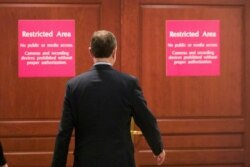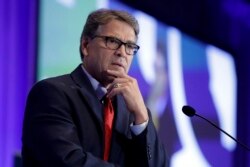The former U.S. ambassador to Ukraine Marie Yovanovitch told House committees leading the impeachment inquiry into President Donald Trump that the president pressured his State Department to remove her from her post.
The revelation was first reported by The Washington Post, which said the newly disclosed information was in Yovanovitch’s prepared remarks that it obtained.
Trump recalled Yovanovitch from her U.S. ambassadorship to Ukraine last May after unfounded claims she sought to undermine his policies.
In her prepared testimony, the former ambassador said the decision by her superiors to remove her was based on “unfounded and false claims by people with clearly questionable motives.”
The longtime diplomat said she was “incredulous” over her removal from the position, despite the State Department’s belief she had “done nothing wrong.”
Yovanovitch on Friday testified privately before the committees, despite previous efforts by the State Department to block officials from being deposed.
The White House is refusing to participate in the impeachment inquiry, calling it "unconstitutional." and the State Department has, thus far, blocked U.S. ambassador to the European Union and Trump donor Gordon Sondland from giving voluntary testimony.
Trump continues to maintain that his July 25 phone call with Ukraine's president Volodymyr Zelenskiy--which prompted the impeachment inquiry-- was innocuous.
Zelenskiy has also stated that there was "no blackmail" in the call in which Trump asked Zelenskiy to investigate Democratic presidential frontrunner and former Vice President Joe Biden, and his son, Hunter.
There is no evidence of any wrongdoing by Joe or Hunter Biden.
After President Volodymyr Zelenskiy earlier in the day stated there was "no blackmail" in the July 25 call with Trump, the U.S. leader told reporters, "We released a perfect conversation. The president of Ukraine just confirmed that and that should be case over."
Trump alleges that when Biden was vice president, he threatened to withhold loan guarantees to Ukraine unless the government stopped investigating a gas company on which Hunter Biden, held a board seat.
House committees on Thursday issued a subpoena for Trump's energy secretary, Rick Perry, as well as two associates of the president's outside lawyer, former New York City Mayor Rudy Giuliani.
"I don't know why they would be calling Rick Perry. I don't know why they would be calling all these people. It is a very bad situation for our country," Trump said to reporters on the White House South Lawn before boarding the Marine One helicopter.
House Democrats say Perry may have "reinforced the stark message" Trump conveyed to Zelenskiy. Perry says his only interest was to get Trump to talk to the Ukrainians on energy matters.
Former White House advisor on Russian affairs Fiona Hill is expected to testify on Monday. Also scheduled to testify next week are Deputy Assistant Secretary of State George Kent, State Department counselor Ulrich Brechbuhl, and U.S. Ambassador to the European Union Gordon Sondland.
Sondland was originally scheduled to testify last Tuesday but did not appear. Shortly thereafter, Trump tweeted he could not allow Sondland to testify because the Democratic-led investigation was "compromised."
House investigators subpoenaed Sondland hours after he did not appear. His lawyers said Friday he would testify next Thursday, although he has not been authorized to release documents investigators have sought.
According to a whistleblower complaint, and a rough transcript of the call released by the White House, Trump urged Zelenskiy to open an investigation into Biden.
The three main House committees conducting the impeachment inquiry have released a set of text messages obtained from former U.S. envoy to Ukraine Kurt Volker, including one Volker sent to Zelenskiy aide Andrey Yermak saying, "We will nail down date for visit to Washington" if Zelenskiy "convinces Trump he will investigate."
Zelenskiy was elected in April on a platform of rooting out corruption. Now the Ukrainian leader is facing criticism over his own conduct, according to political analyst Ilya Kusa of the Ukrainian Institute of the Future.
"It has become his first international diplomatic crisis. He allowed us to get involved in the American elections and this is not the thing that we should have done because we have plenty of our own problems and trying to get into this process it's too global, too big a game to play. And, of course, too risky because Ukraine here is just a gambling chip," says Kusa.
Volker last week gave closed-door testimony to the House Intelligence, Foreign Affairs and Oversight committees.








